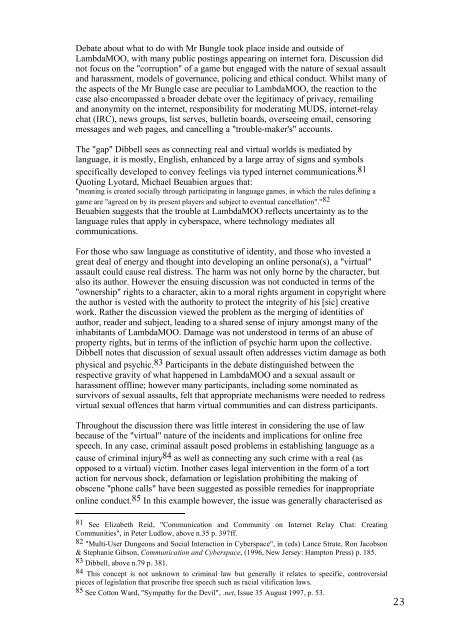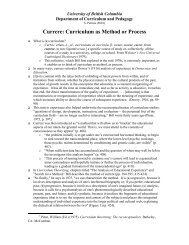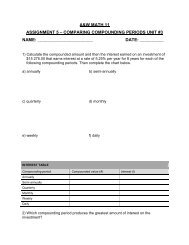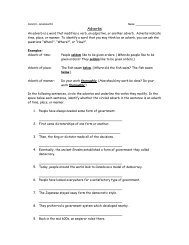ETHICAL BOUNDARIES AND INTERNET CULTURES
ETHICAL BOUNDARIES AND INTERNET CULTURES
ETHICAL BOUNDARIES AND INTERNET CULTURES
Create successful ePaper yourself
Turn your PDF publications into a flip-book with our unique Google optimized e-Paper software.
Debate about what to do with Mr Bungle took place inside and outside of<br />
LambdaMOO, with many public postings appearing on internet fora. Discussion did<br />
not focus on the "corruption" of a game but engaged with the nature of sexual assault<br />
and harassment, models of governance, policing and ethical conduct. Whilst many of<br />
the aspects of the Mr Bungle case are peculiar to LambdaMOO, the reaction to the<br />
case also encompassed a broader debate over the legitimacy of privacy, remailing<br />
and anonymity on the internet, responsibility for moderating MUDS, internet-relay<br />
chat (IRC), news groups, list serves, bulletin boards, overseeing email, censoring<br />
messages and web pages, and cancelling a "trouble-maker's" accounts.<br />
The "gap" Dibbell sees as connecting real and virtual worlds is mediated by<br />
language, it is mostly, English, enhanced by a large array of signs and symbols<br />
specifically developed to convey feelings via typed internet communications. 81<br />
Quoting Lyotard, Michael Beuabien argues that:<br />
"meaning is created socially through participating in language games, in which the rules defining a<br />
game are "agreed on by its present players and subject to eventual cancellation"." 82<br />
Beuabien suggests that the trouble at LambdaMOO reflects uncertainty as to the<br />
language rules that apply in cyberspace, where technology mediates all<br />
communications.<br />
For those who saw language as constitutive of identity, and those who invested a<br />
great deal of energy and thought into developing an online persona(s), a "virtual"<br />
assault could cause real distress. The harm was not only borne by the character, but<br />
also its author. However the ensuing discussion was not conducted in terms of the<br />
"ownership" rights to a character, akin to a moral rights argument in copyright where<br />
the author is vested with the authority to protect the integrity of his [sic] creative<br />
work. Rather the discussion viewed the problem as the merging of identities of<br />
author, reader and subject, leading to a shared sense of injury amongst many of the<br />
inhabitants of LambdaMOO. Damage was not understood in terms of an abuse of<br />
property rights, but in terms of the infliction of psychic harm upon the collective.<br />
Dibbell notes that discussion of sexual assault often addresses victim damage as both<br />
physical and psychic. 83 Participants in the debate distinguished between the<br />
respective gravity of what happened in LambdaMOO and a sexual assault or<br />
harassment offline; however many participants, including some nominated as<br />
survivors of sexual assaults, felt that appropriate mechanisms were needed to redress<br />
virtual sexual offences that harm virtual communities and can distress participants.<br />
Throughout the discussion there was little interest in considering the use of law<br />
because of the "virtual" nature of the incidents and implications for online free<br />
speech. In any case, criminal assault posed problems in establishing language as a<br />
cause of criminal injury 84 as well as connecting any such crime with a real (as<br />
opposed to a virtual) victim. Inother cases legal intervention in the form of a tort<br />
action for nervous shock, defamation or legislation prohibiting the making of<br />
obscene "phone calls" have been suggested as possible remedies for inappropriate<br />
online conduct. 85 In this example however, the issue was generally characterised as<br />
81 See Elizabeth Reid, "Communication and Community on Internet Relay Chat: Creating<br />
Communities", in Peter Ludlow, above n.35 p. 397ff.<br />
82 "Multi-User Dungeons and Social Interaction in Cyberspace", in (eds) Lance Strate, Ron Jacobson<br />
& Stephanie Gibson, Communication and Cyberspace, (1996, New Jersey: Hampton Press) p. 185.<br />
83 Dibbell, above n.79 p. 381.<br />
84 This concept is not unknown to criminal law but generally it relates to specific, controversial<br />
pieces of legislation that proscribe free speech such as racial vilification laws.<br />
85 See Cotton Ward, "Sympathy for the Devil", .net, Issue 35 August 1997, p. 53.<br />
23

















